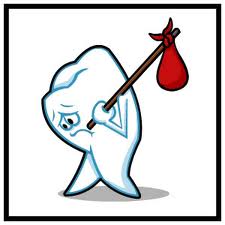Would you consider “vaccinating” you child against wisdom teeth?
New studies are finding a link between those that have had dental local anaesthetic (freezing) between the ages of 2 and 6 and missing wisdom teeth.
Wisdom teeth generally develop between the tender ages of 2 and 6 and erupt in early adulthood. For children who need fillings during this time of development the space where this tooth is developing often serves as the injection site for freezing. These individuals were 4 times more likely to have missing wisdom teeth.
Thus far, the reasoning is that the needle used for the anesthetic is not much smaller than the cells that would become the wisdom teeth. At this early stage these cells are very vulnerable to trauma and so the needle injures the cells enough to stop the development of that tooth. Studies are been conducted using rats that show that the use of diode lasers may also be able to stop the development of the wisdom teeth.
With sixty percent of chewing done on first molars, and almost all the rest is on second molars Wisdom teeth rarely serve much purpose these days. Yet most people develop at least one impacted wisdom tooth, which can cause issues with bad breath, pain, and infection. For this reason, many dentists recommend surgery to remove these teeth. This surgery can also be painful and comes with its own set of complications.
Is this just a convenient side effect or is it something that should be considered for future generations in order to eliminate the need for extraction of these teeth, which for many is very traumatic.
This study was done by Tufts University School of Dental Medicine and was published in the April issue of The Journal of the American Dental Association. They by no means advocate using freezing as a preventative measure, but are looking to draw enough attention to warrant more studies which may lead to this type of future “vaccination”.
Is this something you wish had existed when you were a kid?
For me having all 4 of my wisdom teeth out was not a terribly traumatic experience, having said that, none of them were impacted so it was relatively straight forward for the oral surgeon. Because my experience was somewhat nonchalant I wonder if the trauma of being forced to have a dental needle as a child would have made me less keen on seeking dental care regularly. These fears often follow people into adulthood and play a big role in their oral health.
Those of you that had bad experiences with your wisdom teeth will of course have a different opinion, I would guess that you would have gladly taken a couple of needles if it meant foregoing the torture of the impending extractions.
The problem is, as it is for anything we are trying to prevent is that we can’t tell the future and there are so many variables to consider when making these decisions.
Good news, it will be a long while before this ever becomes common practice so no need to sweat about taking a side just yet. Chances are if this ever does become mainstream they will find something less invasive than a needle – a laser treatment perhaps??
Bad news, because it will be a long while before this ever becomes common practice your children may still need to suffer the same fate you did with regards to their wisdom teeth.
If you want to read more about it check out the following links:
http://now.tufts.edu/news-releases/dental-anesthesia-may-interrupt-development-w


Recent Comments